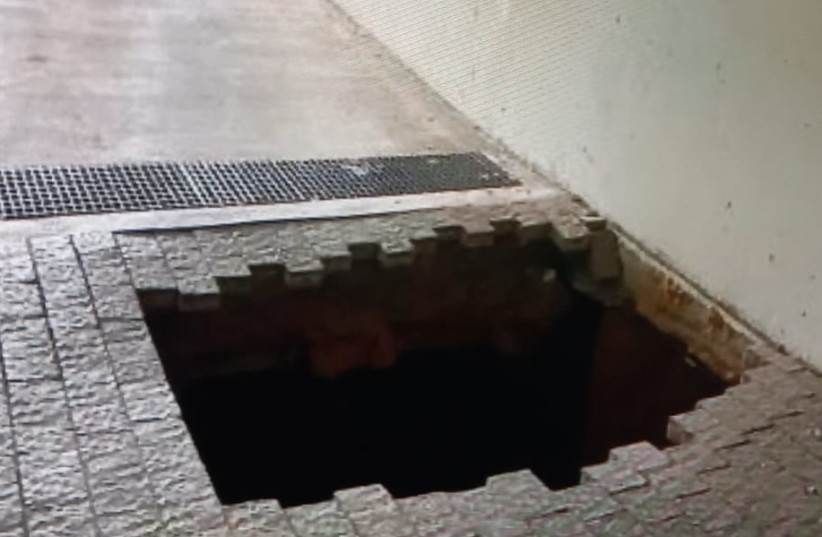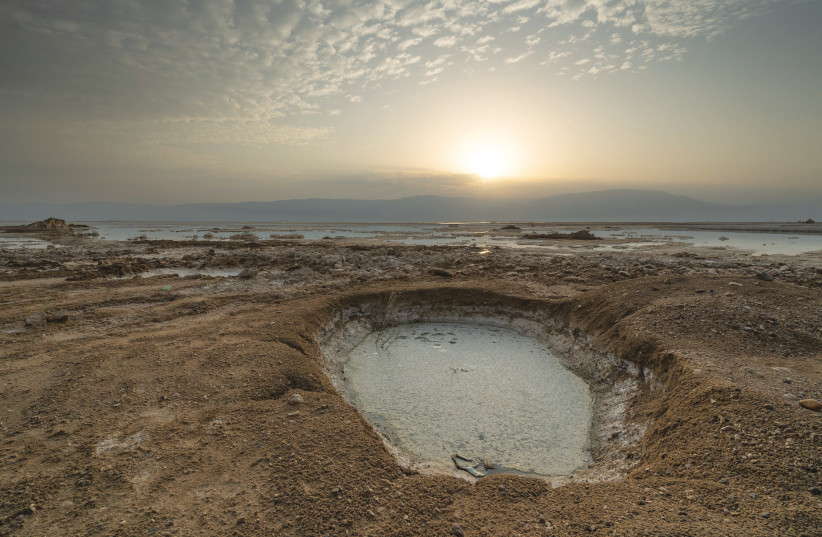A sinkhole opened up on the ground in the Israeli city of Holon on Tuesday, November 8. This came just one day after another sinkhole opened up in a parking lot in Hod Hasharon.
While sinkholes are a phenomenon that occur across the world, they have become increasingly common in Israel over the last year, for a variety of reasons.
The term sinkhole refers to a depression or hole in the ground caused by a form of collapse of the surface layer. They can be life-threatening, and cause substantial damage to the areas they open in.
But what are sinkholes and why do they happen?

What are sinkholes?
A sinkhole is a type of depression in the ground that lacks any form of external surface draining, meaning any water would stay inside the sinkhole and not drain out the surface.
Rain often ends up being the cause behind it, with rainwater flowing into the hole and not being able to be drained, so it can only go down.
Sinkholes are often found on karst terrain, which is when the rocks under the surface are soluble, meaning they can be dissolved by water.
Since the water can't drain externally on the surface, it can only go downward, and therefore it ends up dissolving these rocks.
The kind of rocks that can be found in karst terrain include salt beds and limestone.
When the collapse does inevitably happen, it does so suddenly and often without warning, and the results can be devastating.
According to the US Geological Survey, sinkholes in the US result in at least $300 million in damages each year. However, the US does not have a means of tracking sinkholes nationally, so this is admittedly a very low estimate.
What can lead to a sinkhole?
Human action can also play a role in sinkhole formation.
According to the Pennsylvania Department of Environmental Protection, things that can lead to sinkholes include, but are not limited to:
- Heavy structures or equipment on the surface
- Leaking water or sewer pipes
- Storm drains concentrating water flow
- Water impoundments like dams, ponds or basins
- Disruption in soil layers through digging or drilling
- Decline in water levels due to pumping or drought
- A combination of any of the above
The fact that we know the many different causes of sinkholes and how human actions can cause them is incredibly important - not just from a scientific and safety management perspective, but from an insurance perspective.
The fact that a sinkhole is essentially the ground suddenly giving way with little to no warning and results in heavy damages or death has led to some insurance providers trying to avoid paying out by claiming it as an "act of God." However, the fact that sinkhole causes are understood means that most are predictable and preventable enough that they can't be considered as such.
It should be noted that sinkholes can appear anywhere, and they aren't even necessarily exclusive to land.
For example, underwater sinkholes do happen, the most famous of which are the blue holes in the Bahamas and near Belize.

What sinkholes have happened in Israel?
Aside from the Holon and Hod Hasharon sinkholes, there have been several particularly infamous ones in recent memory.
In September, a massive sinkhole opened up in the middle of the Ayalon highway in Tel Aviv. This is a very busy highway and was relatively close to the bustling Hashalom Interchange.
Somehow, despite the fact that the roads were very busy at the time, no one was hurt.
In July, a sinkhole opened underneath a pool in Carmei Yosef. This was in the middle of a pool party, when the pool was filled with people. One person, 32-year-old Klil Kimhi, actually died by being dragged inside the sinkhole.
A year prior, a sinkhole opened up in the parking lot of Jerusalem's Shaare Zedek Medical Center with seemingly no warning.
And for many years, sinkholes have opened around the Dead Sea.

All of this begs the question of why did all of these sinkholes in Israel happen?
We do know the answer for a few of them. For example, the pool sinkhole was likely due to the pool having been built illegally and without proper licensing. The water and heavy load may have contributed to it.
Regarding the Dead Sea sinkholes, this is due to the water levels receding.
The Tel Aviv sinkhole, however, was later determined to be caused by problematic caverns and tunnels underground. Apparently, the area was not properly surveyed and proper maintenance hadn't been carried out.
As a result, the sinkhole happened.
According to some critics, this seems to be linked to another rather unique Israeli factor: The Israeli “smoh alai” (“trust me”) mentality, the blind belief that “yehiyeh beseder” – everything will be alright.
How to fix a sinkhole?
Sinkholes can be fixed, thankfully.
For sinkholes near structures, stairs and walkways, it is important to first clean the area of any debris or grass. Then it is important to carefully measure the hole and slowly fill it with soil – and importantly, not with rocks or gravel.
After that, it is important to make sure the ground slopes to prevent water from pooling near the sinkhole foundation walls. Then try to let it sit for a few months before doing anything with it.
Another process that can be used in some cases is what is known as concrete slab jacking, which pumps pressurized concrete to help stabilize the sunken area.
In yards, it is important to eliminate anything causing sinkholes like tree stumps, buried/rotting debris and rocks underneath soil.
After you do that, carefully measure the hole and slowly fill it with soil and make sure the land slopes so water doesn't pool.
If the sinkhole was caused by an underground spring. This can't be stopped, but a pipe or catch basin can help control the water flow, though it will need to be routed to a proper area.
Fixing damaged pipes will require more heavy maintenance to repair them.
One of the most dangerous and rarest kinds of sinkholes come from old wells and utilities. This typically happens in very old homes that were made before public utilities, meaning they had their own private septic system or cisterns. These can collapse due to lack of maintenance, causing a sinkhole that may be filled with rusted metal or even fuel.
But with all sinkholes, it is strongly advised that you seek professional help from experts or government services rather than trying to do it yourself.
Jpost Editorial contributed to this report.
